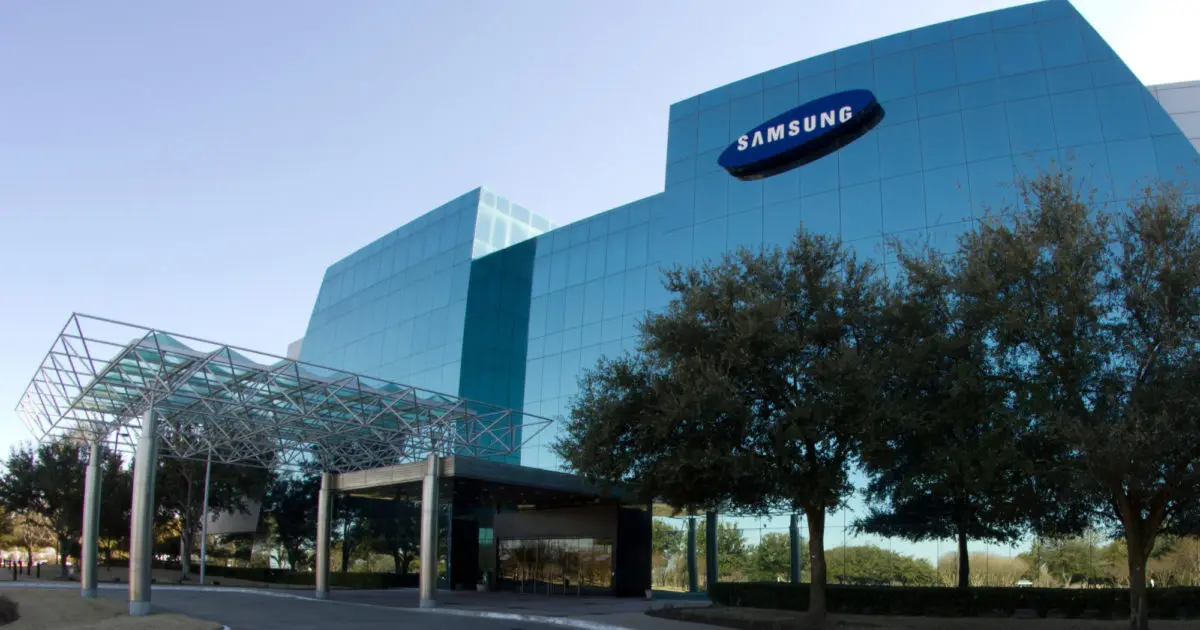Samsung
US Approves $6 Billion Chip Subsidy for Samsung’s Texas Expansion

The Biden administration has decided to reveal that it is awarding more than US$6 billion to Samsung Electronics next week to expand its semiconductor project in Taylor, Texas.
The US Commerce Department is quite close to announcing a grant for the Korean firm’s construction projects in Taylor, Texas, which includes a $17 billion chip-making plant the Korean giants announced earlier back in 2021, another factory, an advanced packaging facility, and a research and development center.
It is reported that it will also include an investment in another unannounced location. The Korean brand will more than double its capital outlay in the US to more than $44 billion as part of the deal. However, regarding this, the Commerce Department and Samsung declined to comment. I requested that Texas Governor Greg Abbott’s office comment, but it was denied.
If the reports are to be believed, Samsung will probably be the third largest in the program, following Taiwan Semiconductor Manufacturing Co. (TSMC), which was awarded $6.6 billion on Monday and consented to expand its investment by $25 billion and add a third Arizona factory by 2030.
The US government is offering a queue of subsidies through the Chips and Science Act, and the reason behind this decision is just to increase American chipset production within the country and also to convince brands to build factories in the US and avoid Asia. Back in 2022, the US Congress authorized the Chips and Science Act to expand domestic semiconductor output with $52.7 billion in research and manufacturing grants. On the other hand, lawmakers also authorized $75 billion in government loan authority, while the reports indicate that Samsung plans to avoid taking loans.
The US share of global chip manufacturing has shot down from 37% in 1990 to 12% in 2020, whereas the Chips and Science Act aims to lessen the dependence of America on chip production in mainland China as well as Taiwan. On the other side, both TSMC and Intel were rewarded $8.5 billion to increase their US chip output last month, which will raise production in the key swing state of Arizona.
Samsung
Samsung One UI Custom Android Skin – From TouchWiz to Today

Samsung consists of the most advanced yet innovative custom Android skin, the One UI, which is highly customizable and offers the most commendable properties to its customers. This is the reason why Samsung’s One UI has always been under the spotlight. Meanwhile, due to its highly customizable functionalities, it is designed to offer an enhanced multitasking experience to Galaxy users. Unlike other custom Android skins, Samsung’s One UI is still considered the best among all due to its innovative interface.
Samsung One UI Android-based Custom Skin
Here you will go through the entire journey of Samsung’s One UI, including how it started and how it’s going.
Years ago, Samsung designed a highly customizable user interface for its Galaxy phones and tablets so that users could have more options to significantly overhaul their devices, from themes and app icons to home and lock screen layouts. However, Samsung has performed a major overhaul to its One UI, and people have witnessed some big as well as small yet relevant tweaks and enhancements within the functionalities and other features of the One UI.
Samsung has always been committed to making its One UI the most advanced UI for its Galaxy devices. Since its arrival, the brand has undergone several changes in order to make it much better, improved, and highly interactive for the users. With every iteration, the One UI has been consistently aimed at refining the experience of Galaxy users. Here’s all about every OneUI iteration.
One UI 1
Samsung introduced the first iteration of its custom Android skin, the One UI 1.0, back in December 2018 along with the Android 9 Pie OS, while the first phone to get its courtesy was the Galaxy S8, followed by the Note 8 and Note 9, respectively. Later on, Samsung provided the next version, the One UI 1.1, as a pre-installed update on the Galaxy S10 and A lineup, along with the foldable Z Fold.

However, as it was the first version of the One UI skin, it arrived with some minor upgrades and enhancements, including optimizations within cameras, authentication methods, and some other performance optimizations as well. In addition, the One UI 1.5 version, pre-installed on the Galaxy Note 10, also added Link to Windows support.
One UI 2
In November 2019, Galaxy users witnessed a new stable version, the One UI 2.0, which was significantly based on Android 9 out of the box. This stable version brought up some significant enhancements within certain functionalities, including the Dark mode, a dynamic lock screen that allows the phone’s wallpaper to change each time the display is turned on, the Files app’s trash folder, and a built-in screen recorder. The One UI 2.1 brought Quick Share functionality, and the One UI 2.5 introduced Samsung DeX for PC and TV.
The brand provided this build to the Galaxy Note 9, Note 10, S9, and S10 lineups, respectively. However, this build already arrived pre-installed on the Galaxy S10 Lite and Note 10 Lite models. Moreover, other versions, including the One UI 2.1, debuted with the S20 lineup, while the next One UI 2.5 build arrived with the Galaxy Note 20, Z Fold 2, and S20 FE models, respectively.
One UI 3
The third One UI iteration was the One UI 3.0, which arrived in December 2020, while the Galaxy S20 models were the first to get the courtesy of this One UI iteration. This iteration arrived with a translucent notification panel and Samsung Free. Also, the One UI 3.0 came with some animation and transition improvements, along with some revamped home screen widgets. However, the next version, One UI 3.1, introduced no new yet noticeable tweaks and functions but brought some improvements within the camera system. Samsung pre-installed One UI 3.1 on the Galaxy S21 lineup, while the third-generation foldables, the Z Fold3 and Flip3, significantly arrived with the One UI 3.1.1 build.
One UI 4
Launched publicly to every Galaxy user, Samsung unveiled its next One UI iteration, the One UI 4.0, in November 2021, which was significantly based on Android 12. The aim of One UI 4.0 is to offer several irrelevant customizations and privacy capabilities with enhanced haptic feedback, round-shaped widgets, and better location features.

The Galaxy S21 models were the first to get this build, while it came pre-installed on the Galaxy S22 series, while the Galaxy Tab S8 got the courtesy of the One UI 4.1 that brought some noticeable changes and upgrades, including night mode portraits, an enhanced calendar, and a revamped palette picker. However, the One UI 4.1 arrival was followed by the One UI 4.1.1 build, which was based on Android 12, and significantly arrived for the Galaxy foldables, Z Flip4 and Fold4, Tab S6 and Tab S7, as well as the Tab S8 series, respectively.
One UI 5
Now was the turn of the next One UI iteration, One UI 5.0, which was released in October 2022 and was based on Android 13. With the One UI 5.0 build, Galaxy users witnessed some significant yet noticeable revamps, and Samsung overhauled its custom Android skin with the One UI 5.0 version, making it smoother among all the aforementioned One UI iterations. It introduces the proper Material You integration, which certainly allows users to apply the changes within the color palette to the entire UI.

Debuted with the Galaxy S22 series models, the One UI 5.0 update introduced much-improved stacked widgets, along with the ability to add numerous users while also including the guest profile. Moreover, Samsung also unveiled the next version, the One UI 5.1, which brought up a revamped gallery, the latest battery widget, and the integration of expert RAW to the Galaxy S22 and the Z Fold4, while Samsung released the One UI 5.1 with the Galaxy S23 series under the hood. Moreover, the next build version was One UI 5.1.1, which significantly arrived with the Galaxy foldables Z Fold4 and Flip4 along with the Galaxy Tab S8.
One UI 6
Meanwhile, here comes the latest One UI iteration, the One UI 6.0, which is still in the limelight, as Samsung has overhauled this latest One UI version with some commendable features and upgrades. The One UI 6.0 is based on Android 14 and debuted with the Galaxy S23 lineup in August 2023, followed by a stable release at the end of October.

Indeed, Samsung’s One UI 6.0 is still the most improved build so far, as it arrived with some significant enhancements and functionalities, including the addition of the camera widget to the home screen, allowing users to choose their desired camera mode right from the widget without having to open the camera app for choosing the specific camera mode.
Basically, it revamped the Galaxy Camera system, with the camera hardware of the flagships reaching 200 MP. Moreover, this build also revamped the Quick Settings tile and brought up some simple arrangements for certain options, including Wi-Fi, Bluetooth, and Airplane mode. There is an option added for lock screen customization with the capability to move the clock as desired, while also adding several fonts and design options for the clock.
After the One UI 6.0 update, Samsung introduced a new build, the One UI 6.1, which is considered the biggest One UI overhaul and is still in the spotlight due to its commendable functionalities that brought up some of the best possible AI features, dubbed Galaxy AI. Debuted with the current flagship series, the Samsung Galaxy S24 lineup, this new One UI 6.1 introduces several AI-powered features, including the Circle to Search by Google, Live Translate, Chat Assist, Note Assist, Generative Edit, Generative Wallpaper, Interpreter, and Transcription, along with several other Galaxy enhancements and relevant upgrades.
However, this build will be followed by the next version, the One UI 6.1.1, which has not arrived officially, but several leaked reports state that the One UI 6.1.1 might introduce some more AI functionalities such as the Video AI feature and other improvements to its upcoming foldables and tablets.
One UI 7
Samsung will launch the next One UI iteration, One UI 7.0, which will be based on the upcoming Android 15 out of the box. Although Android 15 is still under development, it could be presumed that Samsung has already begun working on the next One UI build, One UI 7.0. Soon after Google will introduce the Android 15 version, Samsung will launch the One UI 7.0 build for all of its upcoming Galaxy devices. Also, it’s expected that this latest and upcoming build will go through some significant overhauls and introduce certain improvements within the functionality of the Galaxy UI.
Samsung
Samsung Add Canadian French Language In The List of Galaxy AI Languages

Samsung Electronics Canada has announced that Galaxy AI is now expanding its language support, adding a new language, Canadian French, to allow Canadians to use voice features and translate language more easily on their Samsung devices.
With this new support, Samsung is unlocking new ways to communicate with Canadians. Regarding this, Samsung Canada’s Head of Mobile Business stated, “With continued interest in prioritizing accessibility for Canadians, the introduction of Canadian French to Galaxy AI’s range of languages will break down language barriers for Canadian Galaxy users.”
With the addition of this new facility in Canadian French, users can take advantage of the following Galaxy AI innovations announced earlier this year:
- Live Translate: This feature automatically translates voice calls, face-to-face conversations, and text messages into the preferred languages, so Canadians have the power to choose Canadian French.
- Interpreter: This can provide real-time two-way voice translation; it instantly translates live conversations through a user-friendly split-screen view, permitting us standing opposite each other to read a text translation of what the other person is saying.
- Chat Assistant: This can help perfect conversational tones by initiating context-aware suggestions to authroize communications to sound as they were intended, whether it’s a polite message to a coworker or a short, appealing phrase for a social media caption.
- Note Assist: This has the power to create AI-generated summaries, pre-formatted templates, and cover pages, elevating your day-to-day productivity.
- Transcript Assist: This feature uses AI and speech-to-text technology to transcribe, summarize, and even translate voice recordings.
- Browsing Assist: This lets you stay up to speed on what’s happening in the world while saving time by generating summaries of news articles or web pages.
The Settings application will allow users to download Canadian French as a language pack. In conjunction with the recently debuted Galaxy S24, Galaxy AI is now available on more devices, which include the Galaxy S23 series, Galaxy S23 FE, Galaxy Z Fold 5, Galaxy Z Flip 5, and Galaxy Tab S9 series. And now 2022 Galaxy flagship devices are in line.
Samsung
Free Galaxy S24 with Samsung 2024 TV Pre-Order (UK)

Samsung is launching its 2024 smart TVs in the UK. It’s a golden chance to get free devices as a treat for the buyers, since those who will pre-order these smart TVs as fast as possible.
Samsung made its latest OLED, Neo QLED, and Frame TVs available for pre-order in the UK. Interested customers should hurry up since the pre-order deadline is May 14. The Korean giant is not only introducing the new smart TV but also offering a golden chance to win high-end Galaxy devices such as the Galaxy S24+ or Galaxy S24.
The pre-order bonuses are worth up to £999. In some scenarios, the giant offers free Galaxy S24 smartphones as pre-order bonuses for its 2024 TV lineup. Apart from this, the other early adopter bonuses include free soundbars. Let’s take a closer look at Samsung’s pre-order offers for the UK market:
You can get a Galaxy S24+ that is worth £999 for free when you pre-order any one of these Samsung TVs:
- Samsung QN900D, QN800D, QN95D, or QN90D TV
You can get a Galaxy S24 that is worth £799 for free when you pre-order a device mentioned below:
- Samsung S95D, QN95D, QN93D, QN90D, QN88D, or QN85D TV
You can get a free soundbar worth £599 when you pre-order a Neo QLED 4K or The Frame (2024).
Samsung is also introducing the Music Frame wireless speaker, which is also available for pre-order, and customers who buy two Music Frames will claim a SEE Tickets voucher worth £100. While trading in your old TV for a new one, the giant offers discounts of up to £500.












